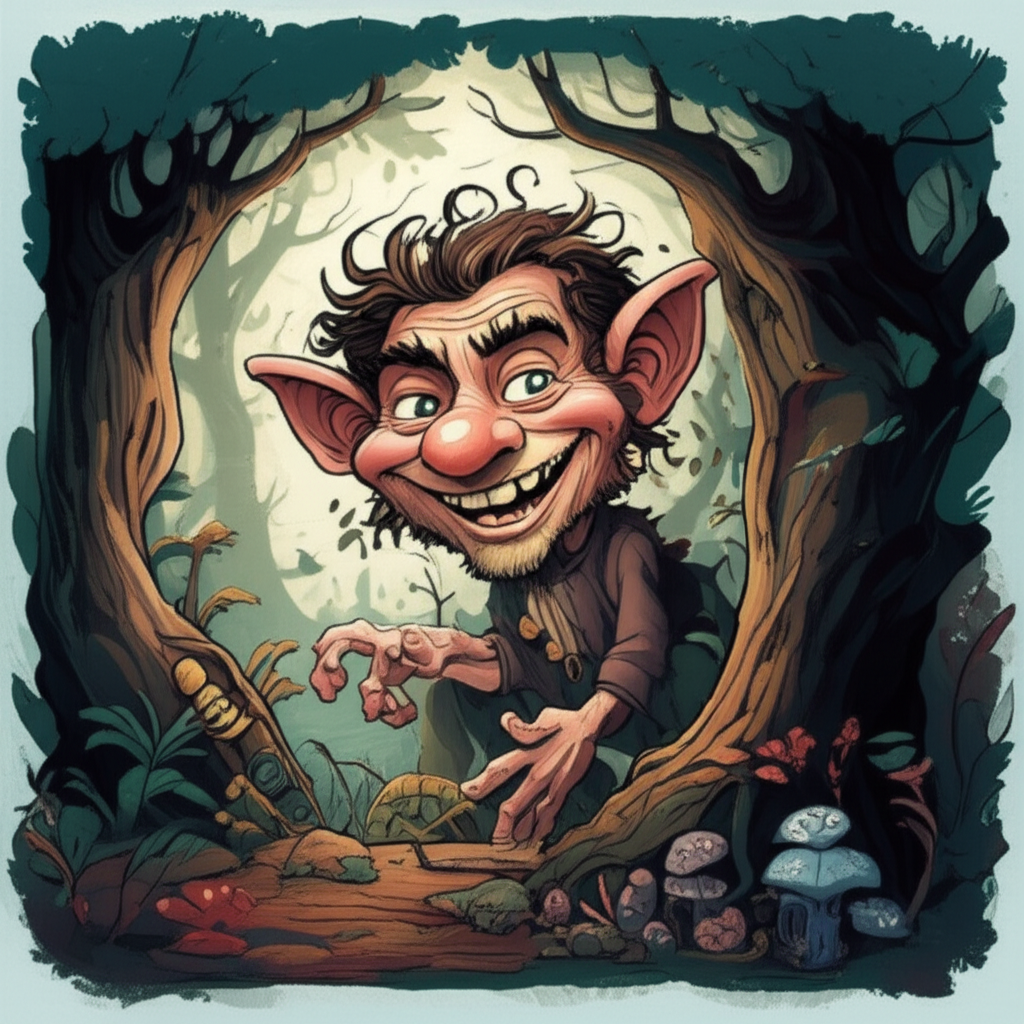
In the tapestry of human storytelling, myths and legends serve as vibrant threads, weaving together the fears, hopes, and understandings of ancient peoples. Among the rich traditions of Slavic folklore, particularly in the Eastern European lands spanning modern-day Russia, Ukraine, and Belarus, one finds a fascinating collection of beliefs surrounding household spirits and the wild, untamed world beyond the hearth. This article delves into one such narrative, exploring the figure of the Domovoi and a conceptual landscape we call the Forest of Shadows, presenting it purely as a cultural artifact—a traditional story told by ancient people for understanding their world. It is crucial to remember that this narrative is entirely fictional, a product of human imagination from a bygone era, and is not to be believed, worshipped, or practiced.
Origins and Cultural Background
The myths surrounding the Domovoi emerged from pre-Christian Slavic societies, deeply rooted in an agrarian lifestyle where survival was inextricably linked to the land and the changing seasons. Life revolved around the village, the family home (the izba), and the relentless rhythm of planting, harvesting, and enduring harsh winters. For these people, the world was alive with unseen forces. The rustling leaves, the crackling fire, the creaking timbers of a house—all might be manifestations of spirits, benevolent or malevolent, that influenced daily life.
In this animistic worldview, boundaries were porous. The forest, a vast and often terrifying expanse, was home to wild spirits like the Leshy (forest guardian) and Baba Yaga (a powerful, ambiguous witch-like figure). The water housed Rusalki (water nymphs), and even the fields had their own entities. Amidst this vibrant spiritual landscape, the home itself needed a guardian, a protector to ensure warmth, fertility, and safety from the unpredictable outside world. This need gave rise to the Domovoi, a spirit embodying the very essence of domesticity and order.
The Guardian of the Hearth: The Domovoi
The Domovoi, whose name derives from the Slavic word dom (house), is perhaps the most beloved and ubiquitous of Slavic household spirits. Often depicted as a small, grey, hairy old man, sometimes appearing as a family member or even a household animal like a cat or dog, the Domovoi was believed to reside in the warmest parts of the house—behind the stove, under the threshold, or in the attic. His primary role was that of a benevolent guardian, a watchful eye over the family, their livestock, and their prosperity.
Symbolically, the Domovoi represented the sanctity of the home, the continuity of family, and the connection to ancestors who had built and lived within those very walls. He was the spirit of domestic order, ensuring that the butter didn’t spoil, the bread rose, and the children slept soundly. A well-cared-for Domovoi, shown respect through small offerings of milk, bread, or tobacco, would bring good fortune, protect against fire, and even warn of impending dangers by making noises or subtle movements. However, a neglected or displeased Domovoi could become mischievous, hiding objects, making strange sounds, or even driving a family from their home—a stark reminder of the importance of respect and harmony within one’s domestic sphere. Unlike the wild, untamed spirits of the natural world, the Domovoi was a spirit of human-made order, a constant presence that subtly shaped the lives within its domain.
The Narrative: Borislav and the Whispers from the Forest of Shadows
In a small, wooden izba nestled at the edge of the ancient, whispering woods, lived the Volkov family, and with them, their silent, unseen protector: Borislav, the Domovoi. Borislav was old, even for a spirit, his presence woven into the very timbers of the house, his essence smelling of woodsmoke and warm rye bread. For generations, he had guarded the Volkovs, a line of hardy farmers whose lives were a constant negotiation between the fertile fields and the encroaching mystery of the great forest that loomed beyond their fence line—a place the villagers called the Forest of Shadows.
The Forest of Shadows was not merely a woods; it was a concept, a living entity in the minds of the villagers, embodying all that was unknown, wild, and potentially hostile. Its ancient trees, gnarled and dark, seemed to absorb the light, and tales of lost travelers, strange sounds, and mischievous spirits echoed around every hearth. It was the antithesis of the Domovoi’s domain—chaos versus order, wildness versus domesticity.
One biting winter, a subtle shift began to disturb the peaceful rhythm of the Volkov home. Young Anya, the youngest daughter, a curious child with eyes like deep pools, found herself increasingly drawn to the edge of the forest. Her grandmother, with a shiver, would warn her, "The Forest of Shadows whispers to those who listen too closely, child. It steals the warmth from the soul." Anya, however, was fascinated by the glint of ice on the branches and the phantom shapes she imagined in the deepening gloom.
Borislav, usually content in his warm corner behind the stove, felt the creeping chill. It wasn’t the winter’s cold; it was a disharmony, a subtle discord emanating from the very boundary between the izba and the wilderness. He saw Anya lingering longer by the woods, her laughter less bright, her eyes holding a distant, unfocused gaze. The livestock, usually calm, grew skittish. Milk curdled too quickly, and the fire, Borislav’s constant companion, seemed to flicker with an unnatural dimness, as if a part of its vital warmth was being siphoned away.
This was not a physical threat Borislav could confront with a growl or a hidden object. This was a slow, insidious encroachment of the Forest of Shadows’ influence, seeping into the sanctity of his home, tempting a young, impressionable soul. Borislav knew he had to act, not with brute force, but with the quiet wisdom of ages.
One moonless night, as the family slept, Borislav stirred from his hidden nook. He was not a spirit of the wild; the forest was alien to him. Yet, the safety of his family depended on him pushing the boundaries of his domain. He slipped through the cracks of the izba‘s wooden walls, a wisp of unseen presence, and glided towards the forest edge.
He did not venture deep. His power was tied to the home. Instead, he stood at the threshold, where the carefully trodden path met the tangle of ancient roots. He could feel the cold, drawing energy, the subtle seduction that had been pulling Anya. Borislav extended his unseen influence, not fighting, but reaffirming. He wove a subtle barrier, a web of domestic warmth and ancestral memory, between the encroaching shadow and the izba. He infused the very air with the scent of hearth smoke, the quiet lullabies of generations, the steadfastness of the Volkov lineage. He whispered, not with a voice, but with a feeling, a deep, abiding sense of belonging and safety, drawing a clear, invisible line in the frosty air.
As dawn approached, Borislav returned to his post. The chill in the izba had receded. Anya, when she awoke, found her fascination with the forest diminished, replaced by a renewed joy in her familiar surroundings. The fire burned brighter, the livestock settled, and the family felt a subtle, inexplicable sense of renewed well-being. Borislav, the quiet guardian, had done his work, reminding the Forest of Shadows of the inviolable boundary of the home, and reminding the Volkovs, without their knowing, of the warmth and security that lay within their own four walls.
Symbolism and Meaning
This narrative, like many myths, is rich with symbolic meaning for the ancient Slavs. The Domovoi embodies the vital importance of the home as a sanctuary, a place of order, safety, and continuity in a world often perceived as hostile and unpredictable. It represents the ancestral spirit, the collective memory and protection passed down through generations. The need to appease the Domovoi reflects the belief that even inanimate objects or unseen forces required respect and care to maintain harmony.
The Forest of Shadows, on the other hand, symbolizes the wild, untamed aspects of nature and the unknown. It represents chaos, danger, the potential for getting lost, and the seductive allure of what lies beyond the familiar. The Domovoi’s subtle confrontation with the forest’s influence is a metaphor for the constant human struggle to create and maintain order, warmth, and civilization against the overwhelming forces of nature and the anxieties of the unknown. It speaks to the human need for boundaries, both physical and spiritual, and the quiet vigilance required to protect them. The story underscores the idea that true strength sometimes lies not in overt power, but in steadfastness, tradition, and the subtle assertion of one’s domain.
Modern Perspective
Today, the tales of the Domovoi and the Forest of Shadows continue to captivate, albeit from a different perspective. In literature, they inspire fantasy novels, children’s stories, and even horror tales that explore the psychological depths of fear and security. In video games and movies, elements of Slavic folklore, including household spirits, often appear as mystical guardians or mischievous entities, adding depth and cultural flavor to fictional worlds.
Culturally, these myths are studied by folklorists, anthropologists, and historians as invaluable insights into the worldview, social structures, and spiritual beliefs of ancient Slavic peoples. They offer a window into how early communities grappled with existential questions, explained natural phenomena, and codified social behaviors through storytelling. The Domovoi can be interpreted metaphorically as the human desire for a stable, secure home, and the Forest of Shadows as the ever-present anxieties of the outside world or the untamed aspects of our own psyches. These stories remind us of the enduring power of imagination and the universal human need to make sense of our surroundings.
Conclusion
The story of the Domovoi and the Forest of Shadows is a profound testament to the imaginative spirit of ancient Slavic cultures. It is a traditional cultural story, not a belief system to be adopted, but a rich piece of human heritage. As Muslims, we recognize that only Allah is the true Creator and Sustainer of all existence, and that all power and dominion belong solely to Him. Our faith teaches us that all beings and forces in the universe are subservient to His will, and that He alone is worthy of worship.
Yet, we can appreciate the ingenuity and cultural significance of such narratives. They serve as a reminder of the diverse ways in which humanity across different epochs and regions has sought to understand its place in the world, to imbue the mundane with meaning, and to transmit wisdom through the enduring art of storytelling. These ancient tales, while not reflecting truth, enrich our understanding of human history, imagination, and the universal quest for meaning that transcends time and culture.



